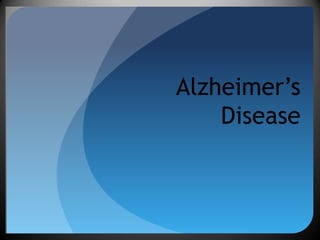
Alzheimers
- 2. General Description Alzheimer’s is a progressive disease, and is the most common form of dementia. This disease is degenerative and, in all cases, terminal.
- 3. Genetically Speaking The mutation of certain genes found on chromosomes 1,14,19, and 21 have all been attributed to causing Alzheimer’s. In early onset Alzheimer's the amyloid precursor protein gene (APP) found on chromosome 21 controls production of the protein amyloid; build up of this protein in the brain has been linked to Alzheimer’s. Early onset Alzheimer’s may also be caused by mutations of the presenilin gene (PSEN-1) found on chromosome 14 or mutations on the presenilin gene (PSEN-2)on chromosome 1. The gene responsible for late onset Alzheimer’s is called apolipoprotein E (APOE) and is found on chromosome 19. Much like the genes found in chromosomes 1,14 and 21 this gene can also produce clumps of protein, or plaques, causing degeneration. However, the presence of any of these gene mutations does not guarantee that the disease will develop.
- 4. Symptoms Changes in sleep/Lack of motivation This can also include mood swings Disorientation: Getting lost or confused about where you are Putting things where they don’t belong Memory loss: Short term memory loss can progress to a point where you can’t remember the names of loved ones Difficulties performing day-to-day or familiar tasks: Brushing your teeth, showering, routine activity
- 5. Prognosis The progression of Alzheimer’s goes from a very small amount of memory impairment to the point where the person can not function and needs extensive care. In the early stages of the disease where there is mild to moderate memory loss the patient would be best in either living with a family member or in assisted living. As years go on the disease becomes more severe; in the final stages of the disease the patient will not be able to communicate and will be in need assistance for every task. Alzheimer’s has no cure and is terminal.
- 6. Statistics 1 in 8 of American’s over 65 will develop Alzheimer’s Alzheimer’s is the 6th leading cause of death in the US, falling in-between accidents and diabetes, that can be neither prevented, cured, or slowed in it’s progression Since the year 2000, the death rate of Alzheimer’s has increased by 66% and an estimated 5.4 million Americans are living with this disease. Every 69 seconds someone in the US alone develops this disease
- 7. Alzheimer’s can affect anyone All though studies have linked certain genes and mutations to the development of this disease, the presence of these genes and or mutations does not guarantee the development of Alzheimer’s, but the absence of them does not ensure that you will not develop this disease either. Anyone, especially over the age of 65, is susceptible to Alzheimer’s.
- 8. Treatments There is no cure for Alzheimer’s, but there are medicines available to help lesson memory loss, confusion, and disorientation. These drugs in no way slow the progression of the illness though. There are also separate medications for the “side effects” of the disorder, like irregular sleeping patterns.
- 9. Technically, the traits for inheriting Alzheimer’s are dominate, so with a single T the trait for Alzheimer’s is inherited. Even though Alzheimer’s is dominant, just because you inherit the trait doesn’t mean you will develop the disease.
- 10. Bibliography Alzheimer’s Facts and Figures. Alzheimer’s Association. (4/20/11). Retrieved from http://www.roanestate.edu.owl/MLA-Format4Websites.htm. 5/20/11. Genetics and Dementia. Alzheimer’s Society.(2008). Retrieved from http://alzheimers.org.uk/site/scripts/documents_info.php? documentID=168>. 5/21/11. What is Alzheimer’s Disease?. Genetics Home Reference. (5/22/2011).Retrieved from http://ghr.nlm.nih.gov/condition/alzheimer-disease. 5/24/2011. Is Alzheimer’s Disease Genetic?. WebMD. ( 2011). Retrieved from http://www.webmd.com/alzheimers/guide/alzheimers-genetic. 5/20/2011. Genetic Mutations Leading to Early Onset Alzheimer’s. Hub Pages. (2011). Retrieved from http://webcache.googleusercontent.com/search?q=cache %3AGk6xND1nkb0J%3Ahubpages.com%2Fhub%2FEasy-no-cook-Cranberry- Sauce+alzheimers+chromosome+error %3F&cd=3&hl=en&ct=clnk&gl=us&source=www.google.com. 5/20/11.